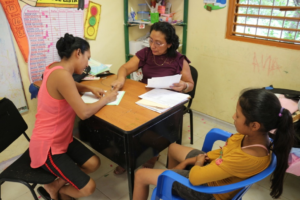Aldo Anzures Tapia, Consulting scholar at PENN Cultural Heritage Center, University of Pennsylvania, Philadelphia, PA, United States.
Accountability policies are meant to improve educational quality; yet, too often, they interfere with quality instruction, including bilingual instruction. Drawing on 18 months of ethnographic work in Palal-na, a multigrade Indigenous preschool in the Yucatan Peninsula in Mexico, the article “Cultures of accountability in indigenous early childhood education in Mexico”, published in Educação & Realidade (vol. 45, no. 2), describes how Elisa— the teacher, principal and janitor in this preschool— navigated demanding administrative tasks while implementing different governmental programs, placing on her a significant bureaucratic burden.
These overwhelming tasks led her to shift her attention from what I argue is the turn from a culture of teaching-and-learning in schools, to a culture of bureaucratic accountability. Specifically, in the article I refer to the culture of bureaucratic accountability in education as the ways in which governments have burdened teachers with policies and programs that involve tasks that move them away from teaching, and one could assume, as a consequence, move children away from learning what is expected by the school curriculum.
For example, I explore the strategies that Elisa uses for the school to keep its doors open, such as registering the school in the Programa Escuelas de Tiempo Completo, a government program initially designed to foster learning and curb corruption, but in Elisa’s case, it has actually placed an important bureaucratic burden, which has forced her to spend more time filling out paperwork than on her teaching responsibilities. In this way, I show that the accountability of many of these well-intentioned programs, rather than promoting a culture of teaching-and-learning, they have pushed schoolteachers and supervisors in Indigenous multigrade schools to engage in performances where people speak about learning without the latter happening, and focus on filing paperwork ad nauseum.
Elisa’s stories, as depicted in this article, show that early childhood education in Indigenous communities in Mexico depends not just on innovative curricula, but on concrete aspects that respond to larger economic and political factors such as the need for more teachers and less administrative burden. At the end, I show how Indigenous multigrade schools depend on the astuteness and preparedness of frontline workers, such as teachers and school supervisors, as they keenly navigate the culture of bureaucratic accountability that governmental policies impose, while trying not to sacrifice an accountability to their own responsibility to the learners.
Watch Aldo Anzures Tapia’s vídeo in which he talks about his study.
To read the article, access
ANZURES TAPIA, A. Cultures of accountability in indigenous early childhood education in Mexico. Educ. Real. [online]. 2020, vol. 45, no. 2, e99893. ISSN: 2175-6236 [viewed 8 October 2020]. DOI: 10.1590/2175-623699893. Available from: http://ref.scielo.org/7v4wqw
External links
Educação & Realidade – EDREAL: www.scielo.br/edreal
http://www.ufrgs.br/edu_realidade/
About the author
 Aldo Anzures Tapia is an ethnographer of education, who specializes in the implementation of language policies and Indigenous education policies. Currently he is a consulting scholar at the Penn Cultural Heritage Center at the University of Pennsylvania. Aldo earned his PhD in Educational Linguistics from the University of Pennsylvania.
Aldo Anzures Tapia is an ethnographer of education, who specializes in the implementation of language policies and Indigenous education policies. Currently he is a consulting scholar at the Penn Cultural Heritage Center at the University of Pennsylvania. Aldo earned his PhD in Educational Linguistics from the University of Pennsylvania.
E-mail: aldoa@gse.upenn.edu
Lattes: https://gse.academia.edu/AldoAnzures/CurriculumVitae
Twitter: @aldoanzures
Como citar este post [ISO 690/2010]:


















Recent Comments